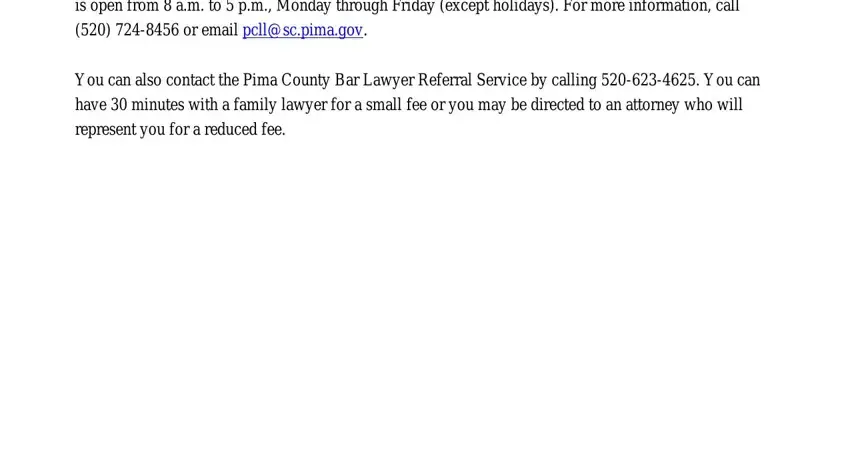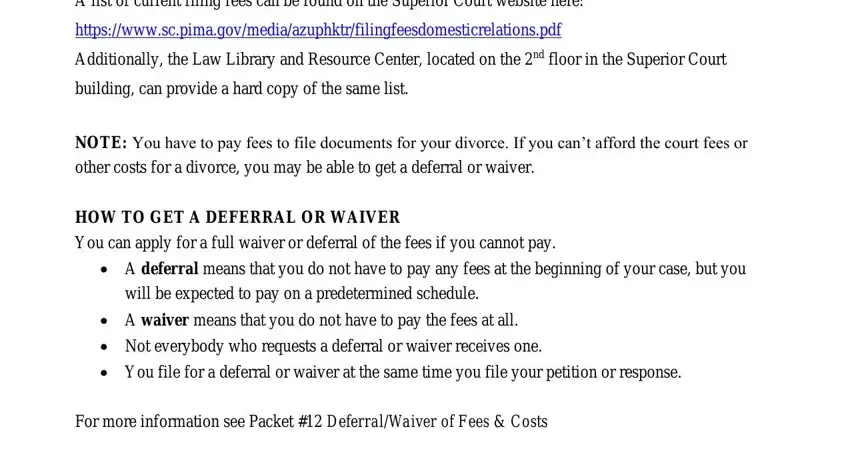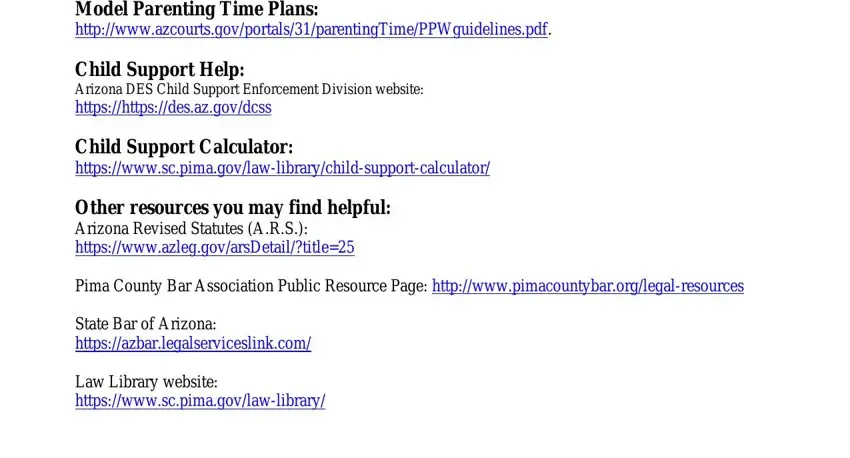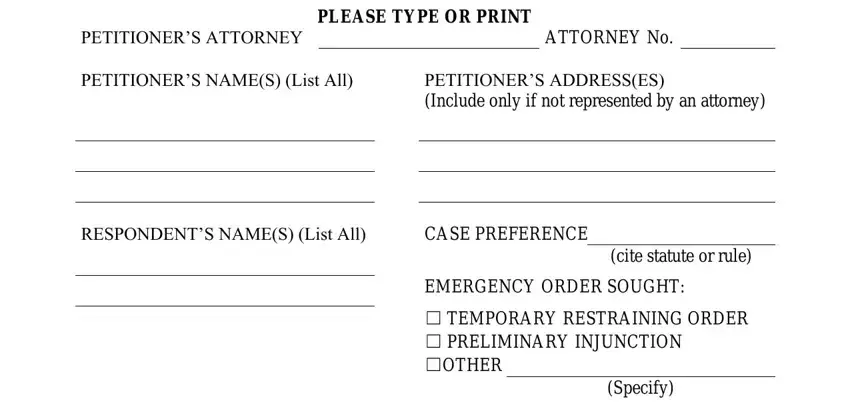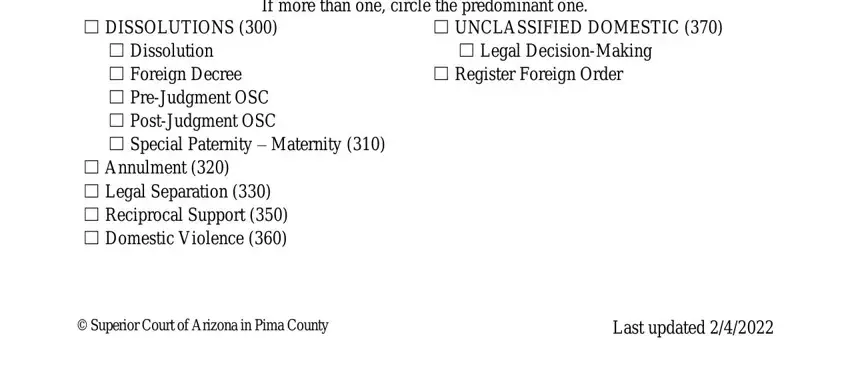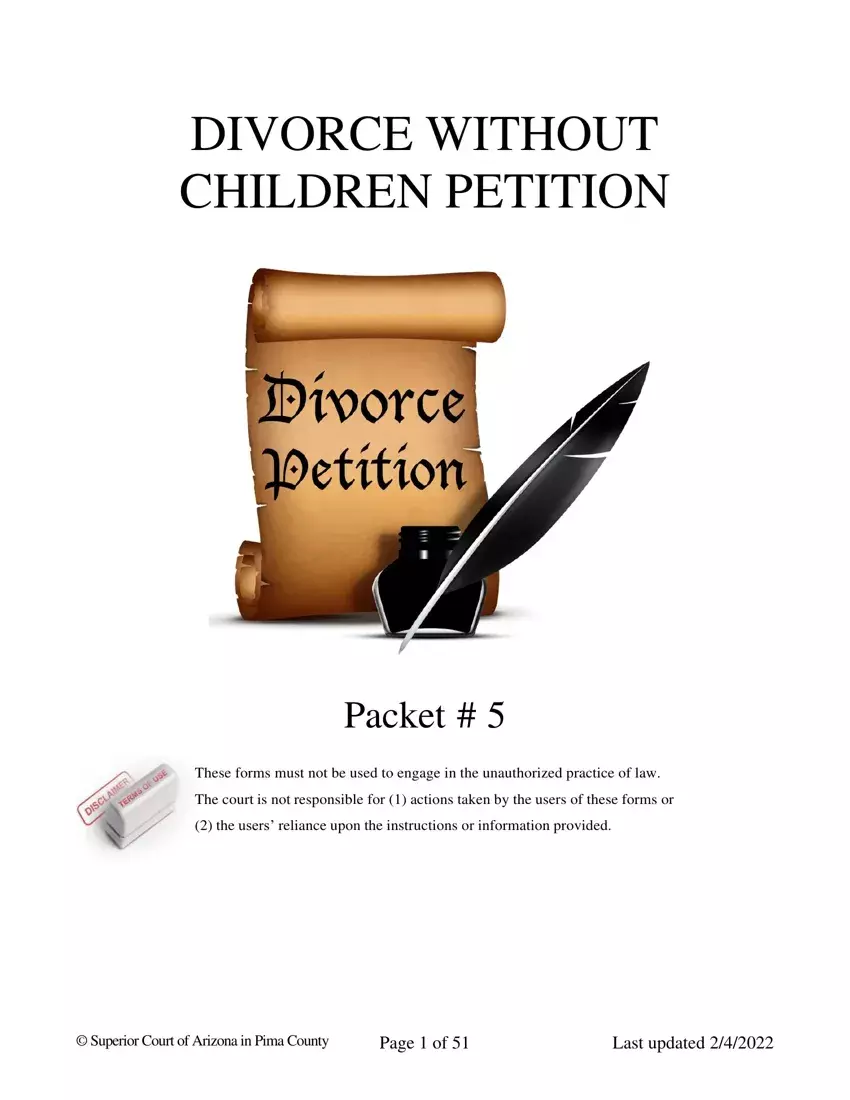DIVORCE WITHOUT
CHILDREN PETITION
Packet # 5
These forms must not be used to engage in the unauthorized practice of law.
The court is not responsible for (1) actions taken by the users of these forms or
(2) the users’ reliance upon the instructions or information provided.
© Superior Court of Arizona in Pima County |
Page 1 of 51 |
Last updated 2/4/2022 |
Read this before you complete any forms in your packet.
Sensitive data, or sensitive information, is information that you might not want other people to see. Sensitive data includes your social security numbers, bank account numbers, credit card numbers, and other financial account numbers.
Court documents, for the most part, can be seen by anyone. If you need to include any of the types of information listed above, you should write “SEE CONFIDENTIAL SENSITIVE DATA FORM” on the document. Then you need to fill out the Confidential Sensitive Data Form. This is where you will include the actual sensitive information.
This is important because the “Confidential Sensitive Data Form” will not be seen by the public.
If you ever need to give the court new information, then you should file an updated sensitive data form. Include all other sensitive data forms that you have already given the court, plus any new sensitive information that you need to tell the court.
If you include “sensitive data” in documents filed with the court, other than on a
Confidential Sensitive Data Form, you do so at your own risk.
See Instructions on Completing the Sensitive Data Form near the end of this packet.
© Superior Court of Arizona in Pima County |
Page 2 of 51 |
Last updated 2/4/2022 |
General Information &
Frequently Asked Questions
Do not fill out all of the forms in all of the packets at the beginning of your case. Complete only the forms that you need for the step that you are working on.
What is a Petition for Dissolution of Marriage?
This petition is a written, legal request for a divorce.
What do “Petitioner” and “Respondent” mean?
Because you are the one asking and filing for a divorce, you are called the
PETITIONER. Your spouse is the RESPONDENT.
Are there any requirements for filing for divorce in Arizona?
In order to file for a divorce in Arizona, you or your spouse must have lived in Arizona for at least 90 days before the time you file. If one of you is in the military, that person has to have been stationed in Arizona for at least 90 days. If one of you has not lived in Arizona for at least 90 days DO NOT FILE. You have to wait until one of you has lived here for 90 days.
Arizona is a no-fault divorce state. This means you only need to show that the marriage is irrevocably broken (meaning there is no reasonable possibility of the two of you getting back together).
What can I ask for in my divorce?
You may ask the court to divide property and assign debt. Arizona is a “community property” state, which means that almost all of the property that you and your spouse got while you were married belongs to the both of you. For more information about community property and the division of property and debt, see Packet #1, General Information.
You may also be entitled to receive Spousal Maintenance (Alimony). For more information, see Packet #1, General Information.
There may also be financial or other issues that should be dealt with before your divorce is final. You can ask the court for Temporary Orders at the time you file your Petition or any time afterward. For more information on temporary orders and how to file them, see Packet #13,
Temporary Orders.
© Superior Court of Arizona in Pima County |
Page 3 of 51 |
Last updated 2/4/2022 |
This symbol is a warning. It can mean a few different things:
•The topic can be confusing and you may need to ask a lawyer for help
•You may need to make sure that something is done
Whenever you see this symbol, make sure you read the information carefully and understand it fully.
Do I need a lawyer’s help?
Court cases can be very complicated, and even if you are representing yourself you should see a lawyer for legal advice as to how the law applies to you, and what is best in your particular situation. This might save you time, money and trips to court, and help you to avoid serious mistakes.
There are lawyers who will help you. They will only charge you for giving you the help you need, and you can complete the court papers on your own or ask the lawyer for help with your papers. For more information, call the Self-Service Center at (520) 724-8456 and ask how to find an attorney.
Where is the Self-Service Center?
The Self-Service Center is a free service located in the Pima County Law Library, Room 256, on the second floor of the Pima County Superior Court (110 West Congress Street, Tucson, Arizona 85701). It is open from 8 a.m. to 5 p.m., Monday through Friday (except holidays). For more information, call (520) 724-8456 or email pcll@sc.pima.gov.
You can also contact the Pima County Bar Lawyer Referral Service by calling 520-623-4625. You can have 30 minutes with a family lawyer for a small fee or you may be directed to an attorney who will represent you for a reduced fee.
© Superior Court of Arizona in Pima County |
Page 4 of 51 |
Last updated 2/4/2022 |
Are you the victim of domestic violence?
Important! Read this first…
Unfortunately, domestic violence may occur in any relationship and may be directed against you personally or against your children.
You are a domestic violence victim if you or your children have experienced:
•Physical acts like hitting, slapping, pushing, or kicking
•Threats of physical violence by phone or in person
•Abusive words and/or behavior used to control you or put you in any kind of danger
•Being followed around throughout the day or having your interaction with others monitored
•Being forbidden to leave your house, or being taken against your will and kept at any other location
•Having someone enter the house against your will, behave in a disorderly manner, and/or damage property
•Conduct that involves disobeying court orders, including interfering with your parenting time
•You DO NOT need to have been seen at a hospital or at a doctor’s office.
•The other person DOES NOT need to have been convicted of domestic violence or assault.
You can get an IMMEDIATE Order of Protection to keep him or her away from you and your children by obtaining a Petition for Order of Protection from the clerk of the court on the first floor of the Pima County Superior Court, Room 131A. You may submit the Petition to any of the following court locations between the hours of 8 am and 4:30 pm.
Tucson City Court |
Pima County Juvenile Court Center |
103 E. Alameda St. |
2225 E. Ajo Way |
(520) 791-4971 |
(520) 724-2045 |
Pima County Consolidated Justice Court |
Pima Superior Court Clerk’s Office |
115 N. Church Avenue, 2nd floor |
110 W. Congress, 1st floor |
(520) 724-3171 |
(520) 724-3210 |
© Superior Court of Arizona in Pima County |
Page 5 of 51 |
Last updated 2/4/2022 |
To get an Order of Protection after hours or on weekends or holidays, call:
Tucson Police Department |
Pima County Sheriff’s Department |
(520) 741-4444 |
(520) 724-4900 |
In case of emergency, call 911.
If you are in a protected location or shelter DO NOT put your address or phone number on the court documents!
If possible, get a P.O. Box or use another valid mailing address on the papers, and tell the clerk of the court about your existing Order of Protection and case number.
You can ask for a Protected Address with the Request for a Protected Address form. Both the Request for a Protected Address and Order for a Protected Address are included at the end of this packet.
You can find more information about Orders of Protection at the Clerk of Court located on the first floor of Pima County Superior Court (110 West Congress Street, Tucson Arizona 85701). They are open from 8:00 am to 5:00 pm Monday through Friday (except holidays). For more information, call (520) 724- 3210.
The Request for a Protected Address is NOT the same form as the Confidential Sensitive Data Form.
© Superior Court of Arizona in Pima County |
Page 6 of 51 |
Last updated 2/4/2022 |
How Do I get a Divorce?
There are a few steps you have to take in order to get a divorce.
Step 1. File your divorce papers
To file a Petition for Divorce, use the forms and instructions in this packet.
This first set of paperwork is the beginning of the divorce process.
Step 2. Serve the divorce paperwork
A copy of your petition must be officially served on your spouse. This tells your spouse that you are asking for a divorce and gives your spouse an opportunity to file a Response to your petition. This step is very important! There are specific directions for how to officially serve the Petition on your spouse. Forms and instructions are in Packet #10 Service of Papers.
Step 3. Request a default decision OR go forward with a divorce trial
If your spouse does not file a Response to your Petition through the court within the time limits of the Summons (see Packet #10 Service on the Other Party), the divorce can proceed as a Default. A Default means that the court will order everything legally reasonable you asked for in your Petition. Before your divorce can proceed as a Default, you must file an application for Default. Forms and instructions are in Packet #11 Obtaining a Default Decree.
If your spouse filed a Response and you cannot reach an agreement, you will need to have a divorce trial. Forms and instruction are in Packet #14 Trial Preparation. If this is the case, you should seek the advice of a lawyer.
Step 4. Get a final decision
To make your divorce final, you have to fill out a Decree to be signed by the judicial officer. The Decree is the final order from the court granting you the divorce and deciding the other issues related to the divorce. Forms and instructions are in Packet #4 Divorce with Children Decree.
© Superior Court of Arizona in Pima County |
Page 7 of 51 |
Last updated 2/4/2022 |
How much will all this cost?
CURRENT FILING FEES
A list of current filing fees can be found on the Superior Court website here:
https://www.sc.pima.gov/media/azuphktr/filingfeesdomesticrelations.pdf
Additionally, the Law Library and Resource Center, located on the 2nd floor in the Superior Court building, can provide a hard copy of the same list.
NOTE: You have to pay fees to file documents for your divorce. If you can’t afford the court fees or other costs for a divorce, you may be able to get a deferral or waiver.
HOW TO GET A DEFERRAL OR WAIVER
You can apply for a full waiver or deferral of the fees if you cannot pay.
•A deferral means that you do not have to pay any fees at the beginning of your case, but you will be expected to pay on a predetermined schedule.
•A waiver means that you do not have to pay the fees at all.
•Not everybody who requests a deferral or waiver receives one.
•You file for a deferral or waiver at the same time you file your petition or response.
For more information see Packet #12 Deferral/Waiver of Fees & Costs
© Superior Court of Arizona in Pima County |
Page 8 of 51 |
Last updated 2/4/2022 |
Volunteer Lawyers Program
Domestic Relations Clinic
Pima County Superior Court has a program through which free assistance is given to people representing themselves in a family law matter.
At the clinic, someone will review your Decrees, Child Support Orders, and Income Withholding Orders to help ensure these documents are complete and legally correct.
Making use of the Clinic is in your best interest. The judicial officer will not sign any documents that are incorrect or incomplete. In such cases, you will have to leave, correct your documents, and then schedule another hearing.
To schedule an appointment call the Pima County Law Library at 520-724-8456, or go in person to the library on the second floor of the Pima County Superior Court for information.
There are lawyers who will help you help yourself
This means that they will only charge for the help you need, and you can complete the court papers on your own.
Court cases can be quite complicated, and talking to a lawyer can help you avoid serious mistakes and save you time, money and trips to the court.
For more information, call the Self-Service Center at 520-724-8456 and ask how to find an attorney. You can also contact the Pima County Bar Lawyer Referral Service by calling 520- 623-4625. You can have one-half hour with a family lawyer for a small fee or you may be directed to an attorney who will represent you for a reduced fee.
We encourage you to also make use of the additional resources following this page for more
information on finding a lawyer.
© Superior Court of Arizona in Pima County |
Page 9 of 51 |
Last updated 2/4/2022 |
Additional Resources Available to You
Trying to change your Legal Decision-Making and Parenting Time Order can be confusing and scary. If you feel you need help with parts of the modification process, you can consult a “limited-scope attorney” who will only charge for giving the help you need. The Self- Service Center and the Domestic Relations Clinic will help you review your documents if you prefer to complete them on your own. You may also wish to contact the Pima County Bar Association’s QUILT program for information about attorneys with reduced fees.
To Find a Lawyer:
Pima County Bar Association Lawyer Referral Service and QUILT program: 520-623-4625 Family Law
Self-Service Center: 520-724-8456
Southern Arizona Legal Aid: 520-623-9465
Mediation Services and Parent Education:
Pima County Conciliation Court: 520-724-5590
•Provides free mediation services to residents of Pima County
•Administers Parent Education Classes
Model Parenting Time Plans:
http://www.azcourts.gov/portals/31/parentingTime/PPWguidelines.pdf.
Child Support Help:
Arizona DES Child Support Enforcement Division website:
https://https://des.az.gov/dcss
Child Support Calculator:
https://www.sc.pima.gov/law-library/child-support-calculator/
Other resources you may find helpful:
Arizona Revised Statutes (A.R.S.): https://www.azleg.gov/arsDetail/?title=25
Pima County Bar Association Public Resource Page: http://www.pimacountybar.org/legal-resources
State Bar of Arizona: https://azbar.legalserviceslink.com/
Law Library website: https://www.sc.pima.gov/law-library/
© Superior Court of Arizona in Pima County |
Page 10 of 51 |
Last updated 2/4/2022 |
